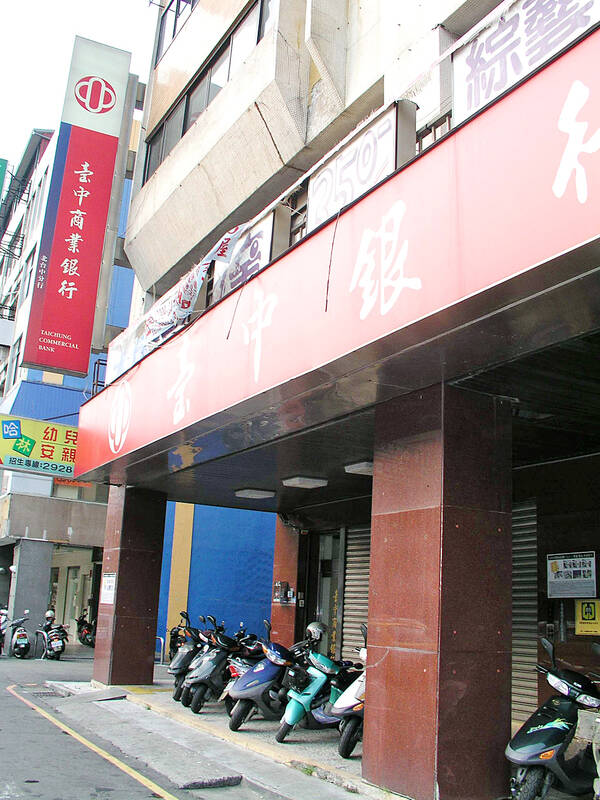Taichung Commercial Bank Co (台中商銀) on Saturday said that it has terminated an agreement to acquire US-based American Continental Bancorp (ACB), citing fast-changing market conditions.
In a filing with Taiwan Stock Exchange Corp, the bank said the two sides reached a consensus not to pursue the deal after taking into account rapidly changing global political and economic conditions.
The two sides also failed to fulfill the terms of the agreement by the deadline, Taichung Bank said.

Photo: Chang Hsieh-sheng, Taipei Times
The Taichung-based bank and ACB signed an agreement in October last year for the Taiwanese bank to acquire a 100 percent stake in ACB in exchange for cash.
The acquisition would have allowed Taichung Bank to boost its visibility in the North American market.
ACB is the holding company of the California-headquartered American Continental Bank, which offers corporate banking services to Chinese-American communities in Los Angeles, Orange, Riverside and San Bernardino counties in California, and in the city of Bellevue in the state of Washington.
In October, ACB said the acquisition price had been tentatively set at US$82.1 million, or about US$41.48 per share, calculated as of June 30 last year.
Taichung Bank said it had agreed to pay US$500,000 to ACB to terminate the acquisition agreement.
The decision to not pursue the agreement was unlikely to have any adverse material impact on its operations, Taichung Bank said.
Despite the failed acquisition, Taichung Bank said it would continue to evaluate any opportunities to extend its reach in overseas markets.
In 2018, Taichung Bank opened a branch in Labuan, Malaysia — its first overseas foothold — and later added marketing offices in Kuala Lumpur, Penang and Kota Kinabalu.
Last May, it obtained approval from the Financial Supervisory Commission to open a representative office in Ho Chi Minh City, Vietnam.

Sweeping policy changes under US Secretary of Health and Human Services Robert F. Kennedy Jr are having a chilling effect on vaccine makers as anti-vaccine rhetoric has turned into concrete changes in inoculation schedules and recommendations, investors and executives said. The administration of US President Donald Trump has in the past year upended vaccine recommendations, with the country last month ending its longstanding guidance that all children receive inoculations against flu, hepatitis A and other diseases. The unprecedented changes have led to diminished vaccine usage, hurt the investment case for some biotechs, and created a drag that would likely dent revenues and

Macronix International Co (旺宏), the world’s biggest NOR flash memory supplier, yesterday said it would spend NT$22 billion (US$699.1 million) on capacity expansion this year to increase its production of mid-to-low-density memory chips as the world’s major memorychip suppliers are phasing out the market. The company said its planned capital expenditures are about 11 times higher than the NT$1.8 billion it spent on new facilities and equipment last year. A majority of this year’s outlay would be allocated to step up capacity of multi-level cell (MLC) NAND flash memory chips, which are used in embedded multimedia cards (eMMC), a managed

CULPRITS: Factors that affected the slip included falling global crude oil prices, wait-and-see consumer attitudes due to US tariffs and a different Lunar New Year holiday schedule Taiwan’s retail sales ended a nine-year growth streak last year, slipping 0.2 percent from a year earlier as uncertainty over US tariff policies affected demand for durable goods, data released on Friday by the Ministry of Economic Affairs showed. Last year’s retail sales totaled NT$4.84 trillion (US$153.27 billion), down about NT$9.5 billion, or 0.2 percent, from 2024. Despite the decline, the figure was still the second-highest annual sales total on record. Ministry statistics department deputy head Chen Yu-fang (陳玉芳) said sales of cars, motorcycles and related products, which accounted for 17.4 percent of total retail rales last year, fell NT$68.1 billion, or

In the wake of strong global demand for AI applications, Taiwan’s export-oriented economy accelerated with the composite index of economic indicators flashing the first “red” light in December for one year, indicating the economy is in booming mode, the National Development Council (NDC) said yesterday. Moreover, the index of leading indicators, which gauges the potential state of the economy over the next six months, also moved higher in December amid growing optimism over the outlook, the NDC said. In December, the index of economic indicators rose one point from a month earlier to 38, at the lower end of the “red” light.